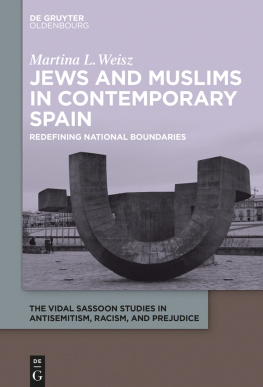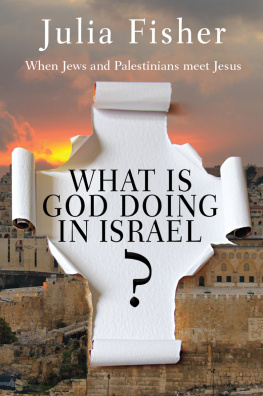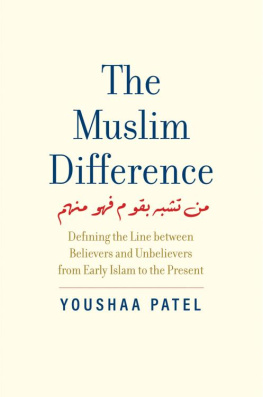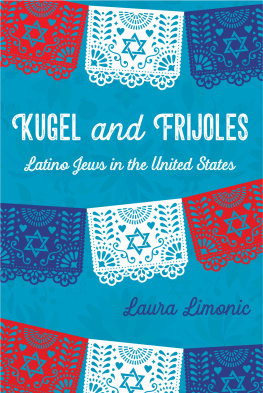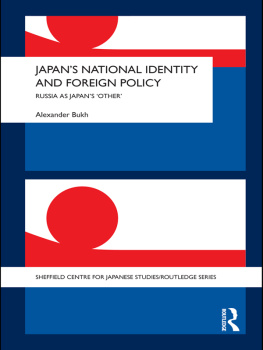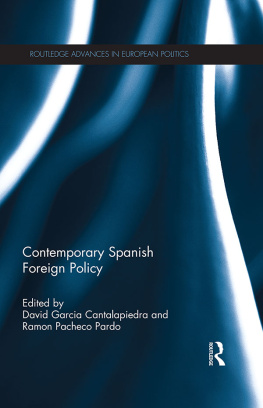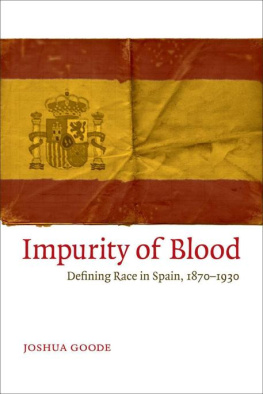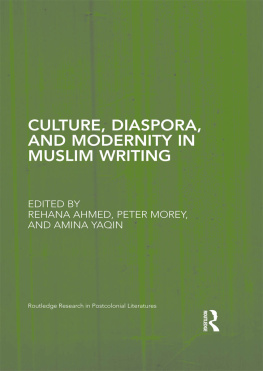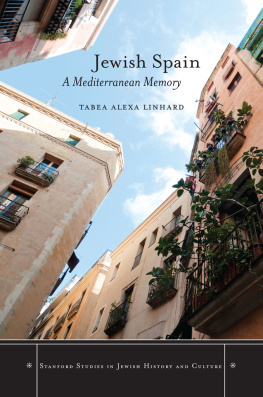Contents
Guide

Martina L. Weisz
Jews and Muslims in Contemporary Spain
The Vidal Sassoon Studies in Antisemitism, Racism, and Prejudice

Edited by
Manuela Consonni
Editorial Manager
Martina L. Weisz
The Vidal Sassoon International Center
for the Study of Antisemitism
The Hebrew University of Jerusalem
Volume 2

ISBN 978-3-11-063790-8
e-ISBN (PDF) 978-3-11-064214-8
e-ISBN (EPUB) 978-3-11-063831-8
Library of Congress Control Number: 2019937009
Bibliographic information published by the Deutsche Nationalbibliothek
The Deutsche Nationalbibliothek lists this publication in the Deutsche Nationalbibliografie; detailed bibliographic data are available on the Internet at http://dnb.dnb.de.
2019 Walter de Gruyter GmbH, Berlin/Boston
Cover image: Monument to Tolerance, Seville, Spain;
photographer: Rubn J. Wengiel
www.degruyter.com

Dedico este libro a mi madre,
Dora Mara,
quien tuvo el valor
de elegir la vida.
Acknowledgments
First and foremost I would like to express my gratitude to Manuela Consonni, Raanan Rein and Ethan Katz for their crucial support for the completion of this book project.
During my research trips to Spain, I met many people who shared with me their wisdom, their experience, and their precious time. In Madrid, I enjoyed the help and the warm hospitality of Beatriz Fernndez-Garca and her family, as well as of Rachel and Jacobo Abecasis. Jos Carlos Rueda Laffond, Professor at the Universidad Complutense de Madrid, arranged access to the Universitys libraries for me. I am also indebted to those who agreed to be interviewed: Juan Sisinio Prez Garzn, Uriel Macas, Rachel Henelde-Abecasis, Ester Bendahan, Jacobo Israel Garzn, Sidi Karim Viudes, Julia Escobar Moreno, Mara Dolores lgora Weber, Enrique Rodrguez de Llera Garca and Masha Gabriel.
Gail Diamond also contributed to this work with her wide knowledge and editing expertise. She has been an incredibly helpful and kind person to work with.
Lastly, this endeavor would have been much harder without the support and encouragement of my mother Dora and my dear friend Michal Padoa. As always, I am profoundly grateful to my life companion Rubn Wengiel, who makes everything possible by the power of his love.
1 Introduction
Events taking place in Spain and its colonies in the late medieval period and early modernity were crucial to establishing the global structures of religious and racial difference that persist in todays world. It was indeed in the Iberian Peninsula, during the 1430s, that words like raza race and linaje lineage, which had hitherto been associated to horses and dogs, begun to be applied to Jews and Moors. This phenomenon coincided chronologically with the appearance of anti- converso ideologies, which would turn theological categories (like Jew and Muslim), into biological ones ( limpieza de sangre ).
It is precisely this concept of race, one that associates issues of blood purity with relatively recent conversion to Christianity, which was later applied to the classification of peoples in the Spanish colonies. This ordering was crucial for the correct organization of a colonial enterprise whose stated mission was to impose Christianity upon a population of pagans and heretics.
In Spain, the conceptualization of religious difference as a biological problem, and the subsequent hierarchization of the human population along racial lines was indeed an intrinsic part of Empire building. This intimate relationship can be encapsulated in three decisive events that took place during the historic year of 1492. That was the year of the discovery of America by Christopher Columbus, but also of the definitive victory of the Catholic Kings over the Muslim-Arab rulers of Al-Andalus, a cultural-political entity that had ruled major parts of the Iberian Peninsula for almost eight hundred years. Lastly, that same year the entire Jewish community was expelled from the Catholic Kingdom by Royal Edict, establishing a precedent that would subsequently Considered as a proof of the Spanish peoples chosennes, this purity became a central pillar of the imperial task of global evangelization.
These seminal moments in Spanish history have affected the construction of Spanish national identity until this very day. Up to the eighteenth century, no relevant political group contested the assumption that the Spanish collective body had to be protected from the contaminating influence of both Muslim and Jewish blood through institutions like the blood purity statutes and the Tribunal of Inquisition. The advent of the Enlightenment broke this consensus, although it did not call into question the self-identification of the vast majority of the Spaniards with Catholicism. Even the Spanish liberals and reformists of the nineteenth century, despite their strong anti-clericalism and their vehement repudiation of anything related to Catholic integrism, perceived Spain as a Christian State. In fact, they claimed that both the Inquisition and the blood purity statutes went against the essence of the Spanish people precisely because tolerance is one of the core values of Christianity.
With the advent of democracy after Francisco Francos death in 1975, Spain created the institutional and political basis for the establishment of a multi- In 2015, the Cortes (Spanish parliament) passed a law granting citizenship to the descendants of expelled Jews, which constituted an important landmark in the long process of re-encounter/reconciliation between Spain and Sephardic Jews all over the world. Without any doubt, the will of the successive Spanish governments of the democratic era to reconnect Spanish culture and identity to its Jewish and Muslim-Arab roots has been reinforced with its incorporation into the European Community, due to the Europe institutions emphasis on pluralism, multiculturalism, and respect for human rights.
This book analyzes the place granted to Jews and Muslims in the construction of contemporary Spanish national identity, with a special focus on the transition from an exclusive, homogeneous sense of collective self toward a more pluralistic, open and tolerant one, in a European context. The Spanish case is particularly suitable for this study, given Spains crucial role at the genesis of the global hierarchization of the world population along racial lines that took place about five hundred years ago. Interestingly enough, by the end of the twentieth century globalized modernity had produced an inversion of the ethnic and religious patterns that led to its establishment. The obsession with borders and collective homogeneity that pervaded early modernity was challenged by the increasing valoration of diversity, borders permeability, and coexistence of minority cultures within the nation state. In that sense, the efforts undertaken in the Spanish cultural, social and political realms to adapt the countrys structures to these dramatic developments can be considered as paradigmatic of the reassessment of religious difference and national identity in late modernity.
The main focus of this study is on the period 19862006, which witnessed critical developments in Spanish contemporary history, but the analysis extends beyond these dates. In 1986, Spain became a member state of the European Community, and established diplomatic relations with the Jewish state. Moreover, in 2006 the Spaniards commemorated the seventieth anniversary of the beginning of their last Civil War.

